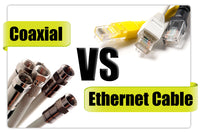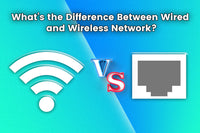Wired internet connections not only connect your computer to other devices but also link you to the broader online world. There are several types of broadband internet available today such as dial-up, DSL, fiber, and cable internet.
Fiber and cable internet are two popular types of broadband connections available in many countries and areas. While they are both faster than old dial-up internet connections, these two internet connections also differ in many aspects.
If you’re considering internet options and both fiber and cable internet are available in your area, which one should you choose? We're here to explain the differences between these two internet connections to help you make the right decision.
What is Fiber Optic Internet?
Fiber-optic internet, often referred to as fiber internet, is the newest broadband internet service. Fiber internet uses optical fibers which are composed of many tiny strands of glass or plastic to transmit data at high speeds. Each individual fiber optic cable has a cladding that can protect the inner optical core from bending, which facilitates data transmission. Generally, an optical network terminal (ONT) is needed in the last mile to transform the light signals into electrical signals.

They offer many benefits of fiber Internet:
- Can provide high bandwidth for large data capacity;
- Fast and symmetrical downloads and upload speeds;
- Cannot be affected by external interference, suitable for severe environments;
- Consistently fast speeds even in traffic peak times;
- High reliability, lower maintenance costs, and high security
However, due to the complexity of infrastructure and high installation cost, fiber optic internet may not be available in rural areas.
What is Cable Internet?
Cable internet is a type of broadband connection that uses the same infrastructure as cable TV to deliver internet access to your home and buildings. Cable internet works by coaxial cables that feature the center conductors, dielectric layer, shielding layer, and outer jacket. Cable internet transmits data via electrical signals, which usually requires a modem in your location to build communications between your computer and ISP's system.

Cable internet is widely used even in some remote areas. It is enough for most home needs and it is easy to install even if you're a network beginner. In addition, there are many bundled options available for saving costs. However, the internet speed can be largely affected during peak usage time, leading to traffic congestion and slower connections.
Differences Between Fiber and Cable Internet
Fiber and cable internet can provide fast internet speeds, but how do they differ from each other? Let's have a look.
Fiber Internet vs. Cable Internet: Which is Faster?
Because of tiny and thin glass or plastic, fibers can carry signals faster than coppers. Therefore, fiber internet can offer extremely fast data transfer over long distances.
While internet speed can vary depending on different ISPs, fiber internet typically offers download and upload speeds ranging from 250Mbps to 1Gbps. Some ISPs even provide higher speeds of 5Gbps or even up to 10Gbps. The speed of cable internet varies from different ISPs, but it generally tends to be slightly slower compared to fiber internet.
Cable Internet features an asymmetric speed, meaning the bandwidth is distributed unevenly between downloads and uploads. Fiber internet has symmetrical speeds, ensuring consistent performance for both downloads and uploads. Thanks to its higher bandwidth and low latency, fiber internet is definitely the winner compared to cable internet.
Fiber Internet vs. Cable Internet: Which is More Reliable?
Cable internet can be affected by environments like extreme weather and moisture. In addition, they tend to be affected by EMI and RFI due to the copper materials. Fibers are highly resistant to severe environments and interference, ensuring stable and reliable transmission consistently.
Fiber vs. Cable Internet: Cost
Cable internet can be much more cost-effective than fiber internet for its easy-to-get materials and simple installation. However, as fiber technology becomes increasingly prevalent, costs are expected to decrease. Fiber internet requires less maintenance and hardware, providing enhanced durability.
Fiber vs. Cable Internet: Availability
Generally, cable internet is more widely available than fiber internet. While fiber internet may be accessible in urban areas, cable internet tends to be more readily available in both urban and rural areas.
Fiber vs. Cable Internet: Installation
Compared to cable internet, fiber internet installation can be more complicated. If you're new to the network, you may need professionals to get cable and fiber internet. If you already have fiber optic cables or copper cables installed at home, you may do it yourself to save on cost. Cable internet is generally straightforward and there are many tutorials available on platforms like YouTube. Fiber internet requires an optical network terminal (ONT) to connect to a fiber-ready router in your home and professional installations are more recommended for it.
Is Fiber Optic Better Than Cable Internet?
Both fiber and cable internet are good choices for internet access. Which one should you choose? It all depends on your specific needs.
If you’re looking for the top and future-proofing speed, fiber internet is your first choice. Fiber internet can offer the optimal gaming experience for online gamers, ensures low-latency development and testing of web programs for software engineers, and delivers high-quality streaming of HD, 4K, or 8K videos for families to enhance viewing experience.
Compared to cable internet, fiber internet is a better choice for businesses especially cloud-based businesses. You business can benefit a lot from fiber internet such as web hosting, real-time collaboration, e-commerce, video conferencing, and other data-intensive applications..The installation of fiber internet can cost more than cable internet, but it is more future-proofing.
Typically, cable internet is enough to meet your basic internet needs. If you care about the budget and convenience, cable internet can be a great choice. There are many bundled services provided by ISPs, such as TV and phone services for cost-effectiveness.
Many ISPs also provide hybrid fiber coax (HFC), which combines the benefits of both fiber and coaxial cable infrastructure. This blend allows for a balance between high-speed performance and cost-effectiveness, making HFC networks a great choice for many users.
While fiber internet boasts superior speed, cable internet remains widely utilized, particularly in remote areas like rural or suburban regions where fiber infrastructure may be lacking.
Other Internet Options
Besides fiber and cable internet, there are several other common types of internet options available to users. Read on for more details.
Dial-Up
Dial-up internet is an old-school solution to the internet, which uses the telephone line and (public switched telephone network PSTN). Users dial a phone number to connect to the Internet Service Provider (ISP). Dial-up internet has been replaced by DSL and cable internet today.
DSL
DSL internet, also called Digital Subscriber Line, uses copper telephone lines to transmit data. This is a not shared internet connection, but can be slower than fiber and cable internet. Though DSL internet is suitable for basic streaming, it may not support HD video streaming The largest advantage of DSL is its wide availability and cost-effectiveness.
Conclusion
Both fiber optic and cable internet have their benefits and drawbacks. Fiber optic internet offers faster and more balanced speeds, making it ideal for gaming, streaming and video conferencing. However, it tends to be more expensive and less available. Cable internet is often more affordable and accessible, but it has slower upload and download speeds and is more susceptible to interference. Choosing fiber optic or cable internet depends on your specific needs and budget.
FAQs
Is fiber or cable internet good for gaming?
Fiber cable is better for gaming due to its lower latency, higher speed, and more stable internet connectivity.
Do I need a special router for fiber internet?
Yes, you need a fiber-ready router and an optical network terminal in your home.
Is 300 Mbps good for streaming?
Yes, 300 Mbps is fast at a download speed of 37.5Mbps per second and typically enough for 2-6 people on different devices.
For more information on this topic, you can keep up on our blogs. While VCELINK offers general and basic information for our customers and other visitors to the website, it’s not professional advice.



Be the first one to comment.
Leave a comment